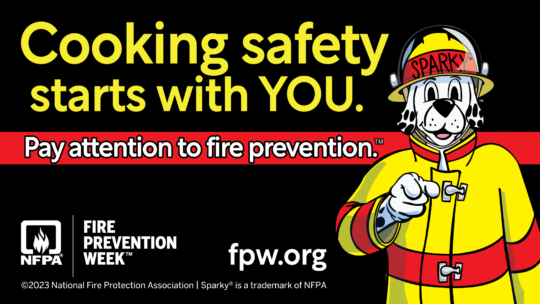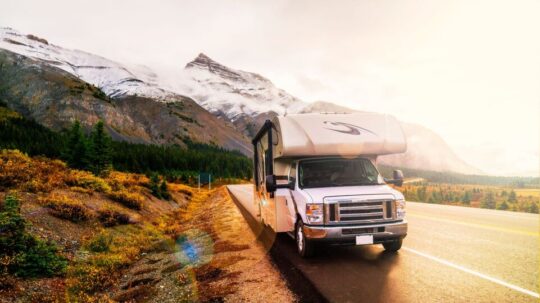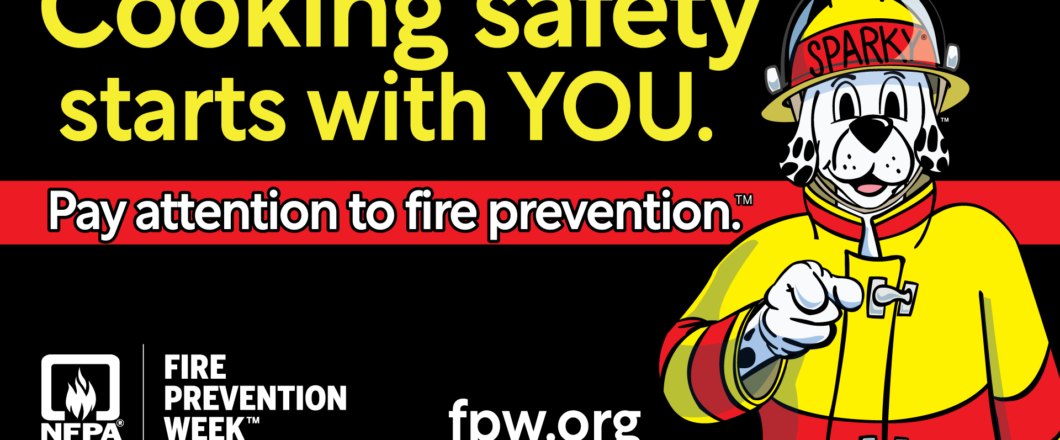
October 8 – 14, 2023 marks Fire Prevention Week!
It’s no secret that food brings people together. Spending time in the kitchen can be a fun way to bring family and friends together, whether you’re making a favorite family recipe, baking up a delicious dessert or experimenting with a new ingredient. But the fun can quickly turn to chaos if a fire occurs in the kitchen. The United States Fire Administration (USFA) says cooking is the leading cause of home fires and fire injuries. That’s why this year’s Fire Prevention Week theme is “Cooking safety starts with YOU. Pay attention to fire prevention.” This year, October 8-14 is recognized as Fire Prevention Week. According to the National Fire Protection Association, fire departments in the United States respond to an estimated average of 172,000 home cooking fires each year. Those fires cause an estimated 550 deaths, 4,820 injuries and more than $1 billion in property damage a year. “To prevent cooking fires, you must stay alert,” says firefighter Michael McLeieer, president of the nonprofit E.S.C.A.P.E. Fire Safety. “You will not be alert if you are sleepy, have consumed alcohol, or have taken medicine or drugs that make you drowsy.” As you start preparing your next meal and organizing that large family feast, remember to play it safe! E.S.C.A.P.E. Fire Safety, First Alert, the NFPA and USFA have some steps you can take to keep your kitchen and kids safe and prevent fires. Remain in the Kitchen When Cooking- An adult should remain in the kitchen when anyone is frying, boiling, grilling, or broiling food.
- Stay at home when simmering, baking or roasting food and check it regularly.
- Watch what you heat – Use a timer when cooking to help ensure you don’t lose track of the time. This is an especially important kitchen fire safety tip for beginner cooks.
- Turn pot handles toward the back of the stove so that no one can bump the pot or pull it over.
- Keep a pan lid or baking sheet nearby while cooking. Use it to cover the pan if it catches on fire as this will put the fire out.
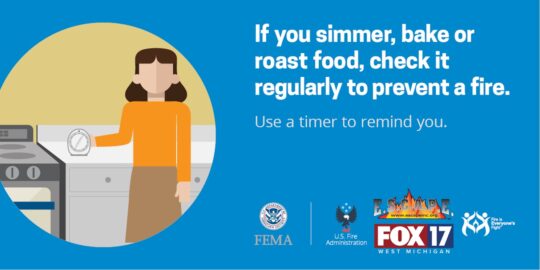 Keep the Kitchen Free from Clutter
Keep the Kitchen Free from Clutter
- Remove items that do not belong in the kitchen and avoid any additional fire hazards.
- Be mindful of kitchen materials that are flammable and can easily start fires such as oven mitts, wooden utensils, towels, curtains or even excess food packaging and keep them away from the stovetop or other cooking surfaces.
- Give everything a specific place in the kitchen to help reduce the risk of it being left out and catching fire, ensuring the kitchen remains a safe place.
- Unplug any countertop appliances when they are not in use, like toasters and coffee makers. This will help reduce the risk of a fire starting.
- Turn off the appliance you are using as soon as you are finished cooking your food.
- Clean off leftover dust, food crumbs and grease from your stovetop after use.
- Install smoke alarms in every sleeping room, outside each separate sleeping area and on every level of the home including in the basement.
- A closed door may slow the spread of smoke, heat and fire.
- Test smoke alarms at least once a month, replace 9-volt smoke alarm batteries at least once a year and replace alarms every 10 years.
- Larger homes may require additional smoke alarms to provide a minimum level of protection.
- Interconnect all smoke alarms throughout the home for the best protection so that when one alarm sounds, they all sound. When you hear a smoke alarm, you may have less than 2 minutes to get everyone outside and safe. Call 9-1-1 once outside and at the pre-designated meeting place (tree, neighbor’s house, etc.).
- Make sure everyone can hear the sound of the smoke alarm anywhere in the home.
- For people who are deaf or hard of hearing, install smoke alarms with alert devices (pillow or bed shaker or a flashing strobe light).
- Install smoke alarms away from the kitchen to prevent nuisance alarms. They should be installed at least 10 feet from a cooking appliance.
- Have a “kid-free zone” of at least 3 feet around the stove and areas where hot food or drink is prepared or carried.
- Never hold a child while you are cooking, drinking a hot liquid, or carrying hot foods or liquids.
- Keep pets off cooking surfaces and nearby countertops to prevent them from knocking things onto a burner.
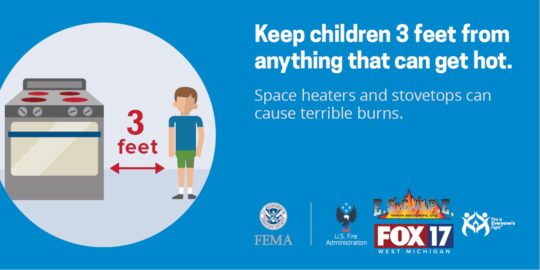 By following these safety tips, you will have a delicious and fire-safe meal!
Here are our television and radio broadcasts promoting Fire Prevention Week 2023
Maranda visits the Coopersville Polkton Fire Department in Ottawa County to learn from experts about the 2023 Fire Prevention Week theme which focuses on safe cooking. – 10-05-2023 11:45 a.m and 3:45 p.m.
WILX News 10 interviews the PIO for Michigan MABAS, Michael McLeieer near Lansing, MI about the 2023 Fire Prevention Week theme. – 10-08-2023 6pm
Fox 17‘s Max Goldwasser interviews E.S.C.A.P.E.’s president and founder firefighter Michael McLeieer about the 2023 Fire Prevention Week theme. – 10-09-2023 7:20 a.m.
By following these safety tips, you will have a delicious and fire-safe meal!
Here are our television and radio broadcasts promoting Fire Prevention Week 2023
Maranda visits the Coopersville Polkton Fire Department in Ottawa County to learn from experts about the 2023 Fire Prevention Week theme which focuses on safe cooking. – 10-05-2023 11:45 a.m and 3:45 p.m.
WILX News 10 interviews the PIO for Michigan MABAS, Michael McLeieer near Lansing, MI about the 2023 Fire Prevention Week theme. – 10-08-2023 6pm
Fox 17‘s Max Goldwasser interviews E.S.C.A.P.E.’s president and founder firefighter Michael McLeieer about the 2023 Fire Prevention Week theme. – 10-09-2023 7:20 a.m.
 WKZO AM 590 and FM 106.9 Morning Show Host Ken Lanphear interviews E.S.C.A.P.E. founder Michael McLeieer about Fire Prevention Week 2023 – 10-09-2023 8:15 a.m.
10-09-2023 – Max Goldwasser expands his fire safety interview during the 9 am hour after 2 children died in an overnight house fire in the City of Kalamazoo.
10-10-2023 10 a.m. – Michael McLeieer visits the Fox 17 Morning Mix to share fire prevention tips.
Read More
WKZO AM 590 and FM 106.9 Morning Show Host Ken Lanphear interviews E.S.C.A.P.E. founder Michael McLeieer about Fire Prevention Week 2023 – 10-09-2023 8:15 a.m.
10-09-2023 – Max Goldwasser expands his fire safety interview during the 9 am hour after 2 children died in an overnight house fire in the City of Kalamazoo.
10-10-2023 10 a.m. – Michael McLeieer visits the Fox 17 Morning Mix to share fire prevention tips.
Read More
12/22/2022 WKZO Radio Interview 7:10 a.m. with Firefighter Michael McLeieer, president and founder of E.S.C.A.P.E. Inc.
12-19-2022 Fox 17 Interview live in studio.
When most people think about the holidays, family festivals and good cheer with friends likely come to mind. What few of us consider is that the holidays also present an increased risk of home fires. Home fires during the holiday season often involve Candles, Christmas trees, holiday decorations and space heaters. By taking some preventative steps, using common sense and following some simple rules, most home fires can be prevented during the holidays and beyond.
Candles
- Candles are widely used in homes throughout the holidays; December is the peak month for home candle fires.
- More than half of all candle fires start because the candles had been too close to things that could catch fire.
- When burning candles, keep them at least 1-foot away from anything that can burn (create a 1-foot circle of safety), and remember to blow them out when you leave the room or go to bed.
- Use candle holders that are sturdy, won’t tip over and are placed on uncluttered surfaces. Avoid using candles in the bedroom, where two of five U.S. candle fires begin, or other areas where people may fall asleep.
- Never leave a child or pets alone in a room with a burning candle.
- Consider using flameless candles, which look and smell like real candles.
Christmas Trees
- U.S. fire departments annually respond to an average of 250 structure fires caused by Christmas trees. Nearly half of them are caused by electrical problems, and one in four resulted from a heat source that’s too close to the tree.
- If you have an artificial tree, be sure it’s labeled, certified or identified by the manufacturer as fire-retardant. If you choose a fresh tree, make sure the green needles don’t fall off when touched; before placing it in the stand, cut 1-2” from the base of the trunk. Add water to the tree stand and be sure to water it daily.
- Make sure your tree is not blocking an exit and is at least three feet away from any heat source, like fireplaces, space heaters, radiators, candles and heat vents or lights.
- Use lights that have the label of an independent testing laboratory, and make sure you know whether they are designed for indoor or outdoor use. Replace any string of lights with worn or broken cords, or loose bulb connections. Connect no more than three strands of mini-string sets and a maximum of 50 bulbs for screw-in bulbs.
- Never use lit candles to decorate the tree.
- Always turn off Christmas tree lights before leaving the home or going to bed.
- After Christmas, get rid of the tree. Dried-out trees are a fire hazard and should not be left in the home or garage or placed outside the home.
- Bring outdoor electrical lights inside after the holidays to prevent hazards and make them last longer.
Space Heaters
- Half of all home heating fires occur during the months of December, January and February.
- Keep anything that can burn at least 3-feet from all heat sources including space heaters, fireplaces, wood stoves and radiators.
- Turn off space heaters when you leave the room or go to bed.
- Space heaters, stoves and ovens are not designed as primary heating appliances.
- Always plug a space heater directly into a wall outlet. Never use an extension cord or power strip.
- Select a space heater that has the label of a nationally recognized testing laboratory (e.g. U.L) and select a space heater that turns off automatically if it tips over.
- If you or someone you know is having difficulty paying a heating bill during the months of November through March, contact your local utility or call 2-1-1 to determine eligibility for a Winter Protection Plan or financial assistance and avoid a service shut-off.
E.S.C.A.P.E. Fire Safety reminds you by following these simple yet important safety tips, everyone in your family will have a “fire-safe” holiday season!
For more holiday fire safety tips, visit www.escapeinc.org or call toll free 1-844-978-4400.
Fire Prevention Week 2022 is October 9th – 15th. The theme is Fire won’t wait. Plan your escape.
2022 also marks the 100th anniversary of Fire Prevention Week. It’s the longest public health campaign in the United States.
Here is a link to the fire prevention segment between AARP Michigan and E.S.C.A.P.E.
Here is a link to the fire prevention segment on the lifestyle show eightWest on WOOD TV 8.
Here is the link to the fire prevention segment on the lifestyle show Maranda Where You Live on WOOD TV 8 and ABC 4 West Michigan on 10/10/2022.
Here is the link to the live radio interview on WKZO AM 590 and FM 106.9 on Morning’s with Ken Lanphear at 7:50 a.m. on 10/11/2022.
Whether you are heading out to the campsite, traveling cross-country over the summer or living in a recreational vehicle (RV), it’s important to know about fire and carbon monoxide (CO) hazards present in these movable structures Where You Live. E.S.C.A.P.E. Fire Safety has facts on RV fires and tips on how to prevent them.
According to the United States Fire Administration, from 2018 to 2020, there were an estimated average of 4,200 RV fires reported to U.S. fire departments each year. These fires resulted in approximately 15 deaths, 125 injuries and $60,300,000 in property loss.
According to the National Park Service:
· Recreational vehicles include everything from folding camping trailers to truck campers to luxury motor homes.
· Eight million U.S. households own at least one RV.
· RVs travel an average of 4,500 miles each year.
Most RV fires occur:
· Between the hours of 2 and 3 p.m.
· During the months of May through August. July is the peak month.
· On Fridays and Saturdays.
Carbon Monoxide in recreational vehicles
CO is an odorless, tasteless, invisible killer that can readily build up within the small area of an RV and cause severe illness and possibly death. Improper use of generators is a leading cause of CO poisoning. Malfunctioning gas-fed appliances are an additional source of CO poisoning. E.S.C.A.P.E. Fire Safety shares these life-saving tips for the RV user
· Check propane supply lines for kinks or damage. Test all fitting connections with a gas leak detection device.
· Turn off propane at the tank and turn off all propane-powered appliances while driving. If you have an accident or tire blowout while the propane is on, your injury and the damage to your vehicle can be significantly worse.
Read More
Fireworks during the Fourth of July are as American as apple-pie, but did you know that 2 out of 5 fires reported on that day are started by fireworks, more than for any other cause? Every Independence Day holiday, thousands of people, most often children and teens, are injured while using consumer fireworks. Despite the dangers of fireworks, few people understand the associated risks which include devastating burns, injuries to the eyes, hands and face, fires and even death.
According to the latest national data from the National Fire Protection Association (NFPA) and Consumer Product Safety Commission (CPSC), U.S. hospital emergency rooms treated an estimated 12,900 people for fireworks related injuries; 54% of those injuries were to the extremities and 36% were to the head. Children younger than 15 years of age accounted for more than one-third (36%) of the estimated injuries.
In Michigan, consumer fireworks became legal January 1, 2012, and must meet CPSC standards. They will only be sold to people 18 years of age or older. Low impact fireworks (ground-based items such as sparklers, toy snakes, snaps, and poppers) are legal for sale and use. In December, 2018, new measures were signed into law (House Bill 5939) that reduce the number of days fireworks can be used, give local government more power to regulate the devices and tighten consumer sales and use.
“The best way to stay safe from fireworks is to not use them. Instead, watch a public fireworks display either in person or on television put on by trained experts,” said Firefighter Michael McLeieer, President of the non-profit fire safety charity E.S.C.A.P.E. “Fireworks are dangerous to people and pets. Using them puts you and your property at risk,” according to McLeieer.
- You can enjoy your holiday and the fireworks by following a few simple safety tips:
- Be safe. If you want to see fireworks, watch a public show put on by the professionals
- Parents and caregivers should always closely supervise children at events where fireworks are used
- Hand-held sparklers burn at more than 1,200 °F and cause 3rd degree burns in seconds. As a comparison, wood burns at 575 degrees F
- If you decide to use sparklers, place discarded sparkler wires in a metal bucket filled with water
- Sparklers account for roughly one-quarter (25%) of emergency room fireworks injuries
- After the fireworks display, children should never pick up fireworks that may be left over since they may still be active
- Adults should not consume alcohol when using fireworks
- Leave pets at home and keep them inside during fireworks displays
- Follow the local ordinance and state law regarding the use of consumer fireworks
E.S.C.A.P.E. Fire Safety urges Michiganders to use common sense, be aware of your surroundings and follow safety rules this Fourth of July during holiday celebrations!
Listen to the live radio interview with Firefighter Michael McLeieer, president and founder of E.S.C.A.P.E. at 7:50 a.m. on Tuesday June 28, 2022 on the WKZO AM 590 and FM 106.9 morning show with Ken Lanphear.
Watch this live report on WLNS 6 News in Lansing during the morning broadcast on Wednesday 06/29/2022.
Watch this live broadcast on WXMI FOX 17 in studio in Grand Rapids during the morning broadcast on Wednesday 06/29/2022 at 8:50 a.m.
Whether you are heading out to the campsite, traveling cross-country over the 4th of July holiday or living in a recreational vehicle (RV), it’s important to know about fire and carbon monoxide (CO) hazards present in these movable structures.
In fact since the COVID-19 pandemic began in 2020, the purchase and use of recreational vehicles has increased significantly. There was approximately a 7% increase in new campers in the U.S. during 2020. People changed their plans to fly or travel abroad and chose to either rent or purchase an RV and go out and explore the outdoors through camping.
Recreational vehicle fires
According to the United States Fire Administration, from 2018 to 2020, there were an estimated average of 4,200 RV fires reported to U.S. fire departments each year. These fires resulted in approximately 15 deaths, 125 injuries and $60,300,000 in property loss.
According to the National Park Service:
- Recreational vehicles include everything from folding camping trailers to truck campers to luxury motor homes.
- Eight million U.S. households own at least one RV.
- RVs travel an average of 4,500 miles each year.
Most RV fires occur:
- Between the hours of 2 and 3 p.m.
- During the months of May through August. July is the peak month.
- On Fridays and Saturdays.
Carbon Monoxide in recreational vehicles
CO is an odorless, tasteless, invisible killer that can readily build up within the small area of an RV and cause severe illness and possibly death. Improper use of generators is a leading cause of CO poisoning. Malfunctioning gas-fed appliances are an additional source of CO poisoning.
E.S.C.A.P.E. Fire Safety shares these life-saving tips for the RV user
- Check propane supply lines for kinks or damage. Test all fitting connections with a gas leak detection device.
- Turn off propane at the tank and turn off all propane-powered appliances while driving. If you have an accident or tire blowout while the propane is on, your injury and the damage to your vehicle can be significantly worse.
- Make sure generator exhaust is pointed away and downwind of the RV.
- Stay in the cooking area when preparing food. If you leave, turn off the burner.
- Have a portable fire extinguisher on board that you can easily reach. Adults should take a brief training course on how to properly use an extinguisher. Remember the acronym P.A.S.S. — Pull, Aim, Squeeze, Sweep.
- Keep doors and windows clear for escape and make sure they open easily. Practice a fire escape plan with everyone staying in the RV.
- Don’t overload the electrical outlets. Using too many electrical appliances at the same time can cause a fire.
- Have a trained technician thoroughly inspect your RV at least once a year.
The above link is from the live interview with E.S.C.A.P.E.’s president and founder Michael McLeieer on the WKZO AM 590 and FM 106.9 Morning Show – 05/26/2022 at 7:10 a.m.
The above link is from the live interview on the FOX 17 – WXMI Morning Show at 7:40 a.m. 05/27/2022
The above link is from the interview on 6 News – WLNS at 5pm on 05/27/2022
Memorial Day is the unofficial kickoff weekend to the start of summertime fun. If your weekend plans include grilling, sitting around the campfire or other outdoor celebrations, here are some important tips to keep you and your family safe!
Campfire Safety
Having a campfire can be one of the greatest joys of summer. Whether roasting marshmallows, cooking a meal or surrounded by family and friends, it’s important to understand how to stay safe around a campfire.
- Select an appropriate location. Before creating a campfire, make sure you understand any rules or regulations for your area. Avoid building the fire near low-hanging branches, tree roots, structures, and other flammable items. Try to choose a location where your fire will be sheltered from the wind and use campfire rings or other designated campfire accessories whenever possible.
- Use the appropriate campfire fuel. Soft woods like pine, fir, and cedar are best for starting a fire. Start the fire by building a small teepee of dry sticks and igniting it with a match. As the fire gets started, add larger pieces of wood. Remember to keep the fire small. Don’t burn items that may explode or give off toxic fumes. Never use gasoline or other flammable liquids to start a campfire. Never throw items into a fire. That includes batteries, plastic bags, glass, and aluminum cans.
CHARCOAL GRILLS:
-
- There are several ways to get the charcoal ready to use. Charcoal chimney starters allow you to start the charcoal using newspaper as a fuel.
- If you use a starter fluid, use only charcoal starter fluid. Never add charcoal fluid or any other flammable liquids to the fire.
- Keep charcoal fluid out of the reach of children and away from heat sources.
- There are also electric charcoal starters, which do not use fire. Be sure to use an extension cord for outdoor use.
- When you are finished grilling, let the coals completely cool before disposing in a metal container.
PROPANE GRILLS:
-
- Check the gas tank hose for leaks before using it for the first time each year.
- Apply a light soap and water solution to the hose. A propane leak will release bubbles.
- If your grill has a gas leak, by smell or the soapy bubble test, and there is no flame, turn off both the gas tank and the grill. If the leak stops, get the grill serviced by a professional before using it again. If the leak does not stop, call 911.
- If you smell gas while cooking, immediately get away from the grill and call 911. Do not move the grill.
- If the flame goes out, turn the grill and gas off and wait at least 5 minutes before re-lighting it.
- Supervise the campfire area continuously. A responsible adult should always be present while a campfire is burning. Encourage small children and pets to stay seated several feet away from the fire. Extinguished campfire areas should still be monitored after the flames have gone out to make sure the campfire does not re-ignite and to make sure that children are not burned by embers, which still retain heat even after the fire is extinguished.
- Completely extinguish the campfire. A roaring fire is both a success, and a responsibility. It is your job to properly maintain and extinguish your campfire when you are finished. Make sure you always have a large bucket of water and metal shovel on hand to put out the fire. Pour lots of water on the fire, drown all embers, not just the red ones, until the hissing sound stops. Stir the campfire ashes and embers with a shovel and pour more water on the ashes, then feel the area to make sure they are cold to the touch.
Grilling Safety
According to the National Fire Protection Association, nearly 20,000 people across the United States went to the hospital due to grilling-related injuries from 2014 to 2018. Grills were involved in nearly 4,000 structure fires in that time. Seven out of every ten adults in the United States have a grill or smoker, which translates to a lot of tasty meals. But it also means there’s an increased risk of home fires and thermal burns. A grill placed too close to anything that can burn is a fire hazard. Remember:
- Propane and charcoal barbeque grills should only be used outdoors.
- The grill should be placed at least 10 feet away from your home or anything that can burn including deck railings and out from under eaves and overhanging branches.
- Keep children and pets at least three feet away from the grill area.
- Keep your grill clean by removing grease or fat buildup from the grills and in the trays below the grill.
- Never leave your grill unattended.
- Always make sure your gas grill lid is open before lighting it.
CHARCOAL GRILLS:
- There are several ways to get the charcoal ready to use. Charcoal chimney starters allow you to start the charcoal using newspaper as a fuel.
- If you use a starter fluid, use only charcoal starter fluid. Never add charcoal fluid or any other flammable liquids to the fire.
- Keep charcoal fluid out of the reach of children and away from heat sources.
- There are also electric charcoal starters, which do not use fire. Be sure to use an extension cord for outdoor use.
- When you are finished grilling, let the coals completely cool before disposing in a metal container.
PROPANE GRILLS:
- Check the gas tank hose for leaks before using it for the first time each year.
- Apply a light soap and water solution to the hose. A propane leak will release bubbles.
- If your grill has a gas leak, by smell or the soapy bubble test, and there is no flame, turn off both the gas tank and the grill. If the leak stops, get the grill serviced by a professional before using it again. If the leak does not stop, call 911.
- If you smell gas while cooking, immediately get away from the grill and call 911. Do not move the grill.
- If the flame goes out, turn the grill and gas off and wait at least 5 minutes before re-lighting it.
Burn Safety
- To reduce the risk of a burn, never leave items cooking on the stove or grill unattended.
- Keep children and pets at least 3-feet from the grilling or cooking area.
- Check the temperature of food before serving it to a child.
- Never cook while wearing loose fitting clothes.
- Cool a superficial or partial thickness burn (1st or 2nd degree) with cool running water for 15-20 minutes. Never cool more than 10% of the body at one time.
- Seek medical attention for all severe 2nd degree and all third degree (full-thickness) burns.
E.S.C.A.P.E. Fire Safety reminds you that Memorial Day weekend activities are more fun when you know that your kids and family are safe and secure because Fire Is Everyone’s Fight®!
Live Interview on WKZO AM 590 and FM 106.9 with our president and founder Firefighter Michael McLeieer – 7:50 a.m. EDT 05/02/2022
Arson Awareness Week 2022 is May 1-7 and it highlights critical actions that emergency responders and the public must take to help ensure everyone stays safe all throughout the year.
The dangers of arson put everyone’s life in peril. Innocent bystanders, occupants, first responders, and those committing the acts of arson all have a chance to receive debilitating injuries or worse. The aftermath of these intentional acts can create a devasting fiscal loss for communities.
This year’s theme is Arson in Homeless Communities – Engagement – Education – Outreach. It’s a great opportunity for numerous stakeholders to join together to combat the issue of vacant residence fires and find solutions for the growing homeless problem as well as develop fire prevention programs within the homeless community.
The focus will be on:
- Explaining common motives for arson fires in homeless communities
- Addressing accidental incidents of fire
- Highlighting injury and incident statistics
- Identifying resources and training opportunities to help the fire service create outreach strategies and programs.
- Showcasing successful mitigation concepts throughout the United States
What is Arson? – ARSON IS THE CRIMINAL ACT OF DELIBERATELY SETTING FIRE TO PROPERTY. (The willful, malicious, intentional and/or reckless burning of your property (dwelling) or someone else’s).
What can you do? If you see something, say something. Call 911.
- Keep an eye on your property and your neighbor’s property
- Report anything suspicious
- Lock vehicles, garages, barns and other out buildings
For more information about arson and ways to prevent arson, visit the United States Fire Administration’s website at www.usfa.fema.gov/aaw
Here are the interviews E.S.C.A.P.E. Inc.’s president and founder Michael McLeieer did promoting National Burn Awareness Week 2022.
WXMI Fox 17 – 8:40 a.m. – 02/07/2022
WKZO AM 590 & FM 106.9 radio – 9:10 a.m. – 02/07/2022



